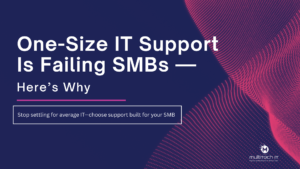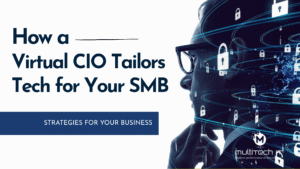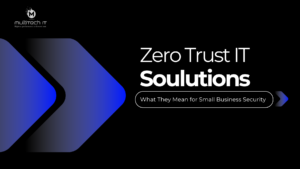Cyberattacks are common these days, and the healthcare industry is the easiest victim of these attacks. A report by Sophos detailed that 88% of organisations in this sector faced ransomware attacks in 2024. And this trend is not going to stop there, which indicates that some worse cases can possibly take place in the future.
Indeed, sensitive patient data, obsolete systems, inadequate compliance arrangements, and staffing shortages attract cyber criminals. In this case, the only ray of hope is the robust IT support partner that can investigate these IT support for medical practices requirements.
Now, let’s reveal some of the most common security risks that lurk over the healthcare industry in 2025.
1. Ransomware Attacks Are Getting Smarter and Costlier
Ransomware has been a major security concern, threatening hospitals, clinics and diagnostic centres with vulnerability. Modern ransomware variants are hyperactive in encrypting data before the attack, which threatens with dual methods of extortion. Many small and midsized businesses are easy targets for being not able to defend themselves from these virtual attacks.
This year (i.e., 2025), cyber spies have some AI-powered algorithms that are laser-fast in detecting network vulnerability. Once discovered, countering them is no longer difficult. But they severely attack at scale. The deep analysis of the market reveals that the average cost of recovery has surpassed $1.85 million, which covers downtime, recovery operations, and reputational damage.
Now just imagine the quantum of loss that the healthcare industry must bear in the absence of dedicated IT support. The breaches devastate their professional lives and even the lives of patients whose data has been breached.
2. Legacy Systems and Software Vulnerabilities
An overview reveals that a significant number of healthcare institutions continue to leverage obsolete electronic health record systems (EHR), legacy Windows platforms, and unsupported hardware. Now imagine how difficult it is to regulate their security patches. Because of this reason, they become the foremost victims of cyberattacks.
Narrow budgets do not allow these healthcare institutions to upgrade their operating systems. This delay in upgrades increases the risk of vulnerability in the long run. Professional IT support for medical practices can be the best way out to avoid them. These practices include routine audits, secure cloud migration strategies, and automating updates and patches. These practices minimise security risks.
3. Data Privacy Regulations Are Getting Stricter
This era of digitalisation has made it convenient and hassle-free to exchange vital health reports that must remain private. Global governments are now seriously considering privacy, which results in tightening healthcare data protection laws. The result? HIPAA, GDPR, and the Digital Personal Data Protection Act (DPDP) have evolved, strictly prohibiting publicly sharing sensitive reports or data. In case it happens, higher fines are levied as a penalty for non-compliance.
For medical practitioners, certain things like data encryption, access control, secure archiving, audit trails, and breach notifications should be strictly implemented to guard data. Otherwise, the resulting breaches can be difficult to navigate. This is where IT support experts are required with tailored solutions because they understand and comply with evolving compliance frameworks in the digital framework.
4. IoMT Devices Are the New Entry Point
Like the Internet of Things, the evolution of the Internet of Medical Things, like insulin pumps, MRI machines, remote patient monitoring devices, and smart thermometers, is transforming the healthcare industry. Unfortunately, their digital nature is the cause of cyber invasions because these devices lack standard security arrangements. So, it’s hard to troubleshoot and retrieve lost data.
Unguarded connected devices can be the reason for losing sensitive medical reports. To prevent cases like this, cybersecurity experts suggest network segmentation, encryption protocols, and continuous vulnerability scans. So, all devices must be regularly checked. A managed IT support expert can be hired to oversee these security measures and necessary implementations, monitoring, and upgrades of these devices.
5. Shortage of Skilled IT and Cybersecurity Professionals
In respect to requirements, the gap of the global cybersecurity workforce is over 3.4 million IT professionals. And the healthcare industry is an acute case of its shortage. Most medical clinics or centres fail to deploy full-time cybersecurity teams. This much gap overburdens limited professionals or administrators, who may not be professionally trained or equipped to handle sophisticated threats.
Outsourcing IT support can be the most cost-effective and viable alternative to understanding and fulfilling technical needs. These professionals put in all efforts to adeptly monitor threats and proactively support in preventing or reversing intrusions, firewall management, and data loss prevention.
6. Phishing and Social Engineering Target Frontline Staff
Cyber spies’ prime targets are doctors, nurses, and administrative staff members, as they have access to sensitive health reports and updates. A 2025 survey revealed that over 70% of infringement cases occur because of human errors, such as malicious email links, fake login pages, and impersonation scams.
Though regular training can help in combating this risk, attackers frequently evolve hacking tactics. So here, IT support services providers can step in to implement advanced email filters. They can simulate phishing tests and enforce multi-factor authentication (MFA) so at least human-driven decisions can be reduced. It is simply to shift the focus of healthcare experts from handling IT devices or products to patients’ health care.
7. Cloud Security Misconfigurations
Cloud migration is now a norm across the healthcare industry. They are more interested in switching to MS Office 365 or servers, especially for EHRs and telemedicine platforms. This is because of their scalability and all-time accessibility features. Improper configuration can expose data to scammers.
IT support professionals or experts can come up in the crucial role of an assistant that helps in guiding how to secure medical practice design. Also, it includes how to comply with cloud architectures. So, from setting role-based access controls to encrypting data, these IT professionals guide in properly using the cloud, but not at the cost of a patient’s safety.
8. Downtime and Disruption in Patient Care
Cyberattacks lead to compromising data, which further hampers patient services. Consider the case of a ransomware attack, which becomes a reason to cancel appointments, postpone surgeries, and delay reports. Even if the loss is of an hour, it threatens lives, particularly of those who need critical care or emergency services.
IT support experts can avert this disaster by following the best practices, ranging from automated backups to disaster recovery and business continuity plans. These arrangements help in bouncing back at the time of cyberattack with minimal impact on patients’ health.
Conclusion
Cybersecurity is a must for the healthcare industry. The threat can be hard to navigate, persistent, and rapidly evolving. Thankfully, managed IT support providers have their solution. They provide specialised knowledge, tools, and agility to completely safe digital spaces of healthcare institutions or clinics. So, you need to take intensive care in choosing who to use for outsourcing IT support services. Only then will you be able to leverage its maximum benefits.








